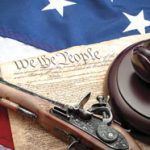LIMITATIONS ON FREEDOM OF SPEECH: A Canadian Perspective
(Republished by Request)
By Roderick MacDonald
Watching CNN of late, it’s hard for a Canadian to get caught up in the hoopla about the recent US midterm election. Nearly everything else of interest was eclipsed by exhaustive (if not exhausting) reports on polls, probabilities and proclivities of various candidates, but I guess we can be thankful for the comic relief provided by the amount of air time dedicated to the practice of witchcraft as a qualification for aspiring senatorial candidates.
However, there is one story that far outweighs all others in terms of its gravity and potential implications for American society. I refer to the US Supreme Court case of Snyder versus Phelps.
This controversial First Amendment case involves members from a fundamentalist church in Kansas who say they want to draw attention to U.S. government policies that tolerate gays in the military and elsewhere. They typically carry signs at funerals that say, “Thank God for Dead Soldiers,” “God Hates Fags” and a variety of other anti-gay insults.
The lawsuit against them was filed by Albert Snyder, a Maryland man whose son, Marine Lance Cpl. Matthew Snyder, was killed in 2006 in Iraq. Snyder sued the Rev. Fred W. Phelps and his followers for intentional infliction of emotional distress after they protested at his son’s funeral.
A jury awarded Snyder $5 million but an appeals court later overturned the judgment, saying the church members’ actions were privileged as free speech under the First Amendment. Now the case is being heard by the US Supreme Court.
Now I would consider myself to be pretty much mainstream and like many of us has had to confront my own prejudices about same sex marriages and gay rights. Nevertheless, I am of the opinion that this case could represent a turning point in American social culture, if Snyder were to win.
And that is a very big “if.”
However, if that were to happen, and it appears doubtful, the US Court may move a little closer to the views held by Canada’s Supreme Court, which places reasonable limitations on free speech. Whatever the US Supreme Court decision, it will come at a time when Americans are facing a flurry of challenges concerning the value of respect for simple human dignity. We witness the unforgiveable consequences of bullying in school as articulated in past weeks by CNN reports of the recent suicides of no fewer than five American teenagers, all of whom allegedly faced daily torment over real or perceived notions of sexual identity.
Further underscoring this lamentable situation, CNN aired several reports recently about an assistant attorney general (if you can believe it) in Michigan who elevated harassment to an entire new level by his personal attacks on a college student president who happens to be gay.
These are the real victims of a growing wave of intolerance in America. While I realize First Amendment protections are not limited to gay-bashing, this is the very real human context in which the US Supreme Court must decide whether to place “reasonable” restrictions on freedom of speech abuses by a handful of cranks and wing-nuts who labor under the illusion that they are marching under personal instructions from the Almighty. Give me a break.
Canada, like the United States, has a constitutional guarantee of free speech. Our Charter of Rights and Freedoms guarantees freedom of expression, subject to such reasonable limits as are “demonstrably justifiable in a free and democratic society.” In other words, we have free speech, but the state can limit it in reasonable ways. This may be contrasted with the absolute language of the First Amendment of the United States Bill of Rights, which states: “Congress shall make no law … abridging the freedom of speech or of the press.” The words of the Canadian guarantee acknowledge the state’s right to limit free speech; the words of the American guarantee forbid the state from doing so.
The Canadian Supreme court has already wrestled with the implications of giving free rein to fruitcakes, and found in several cases that freedom of speech comes with some responsibilities toward our fellow man and places certain restrictions on an open assault on public sensitivities. In one highly publicized case in 1990, the majority of Supreme Court Justices looked at hate speech as not being a victimless crime, but instead having the potential for psychological harm, degradation, humiliation, and a risk of violence.
And that’s really the nut of it. In my opinion, this court also has the responsibility to protect the rights of its more vulnerable citizens from such onslaughts of hatred and bigotry. In other words, a dual responsibility to take the leadership required to move its constituency further along the road to an enlightened society.
While the issue of gay rights has supplanted abortion as one of the most contentious social issue today, it clearly has the ability to inflame passions on both sides. But like the protection afforded a woman’s right to choose, there will be no going back on an individual’s right to choose who they may love or marry.
In the case of Snyder versus Phelps, the issue at stake seems more than whether to censure the unforgiveable insensitivity of the invasion of privacy at a young soldier’s funeral, but also speaks to the need for a strongly worded declaration that this egregious affront to civilized behavior will not be tolerated. It is, at least for some, a matter of life and death.
(Ed. Note: Roderick MacDonald is a former Canadian journalist and writer now living in Ajijic.)
- April 2024 – Issue - March 31, 2024
- April 2024 – Articles - March 31, 2024
- April 2024 - March 31, 2024










